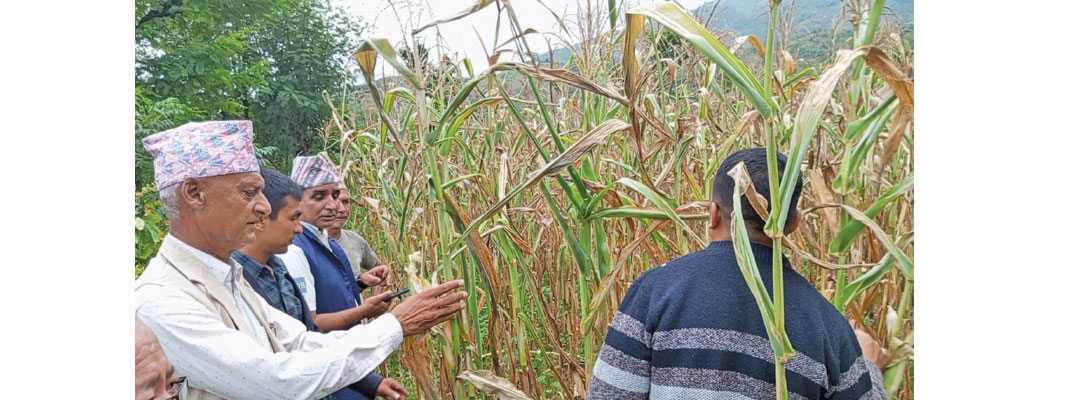Climate Change Impacts Traditional Farming in Nepal: Drought and Pests Ravage Maize Crops

Kathmandu — Climate change is taking a toll on Nepal’s traditional farming system, with devastating consequences for farmers heavily dependent on rainwater due to the lack of irrigation systems. In a recent incident, around 170 hectares of maize crops in Arun Rural Municipality, located in Bhojpur district, have been severely damaged by drought.
The drought affected crops in Jarayotar of Ward No. 6 and Sikretar of Ward No. 7 of the rural municipality, which is a major source of livelihood for many villagers. The dry spell occurred during the monsoon season (June-July), causing the maize plants to wither in the fields due to a severe shortage of water.
Local farmers, like Narayan Thapa, expressed their devastation as they visited their fields only to find dried-up maize plants. “I produced around 20 to 30 muris (80 kilograms each) of maize in my fields annually. However, this season, the plants have dried up,” Thapa lamented.
The drought not only affects farmers’ food production but also poses a threat to their cattle as well. To address the situation, authorities from Arun Rural Municipality’s agriculture section have initiated discussions with provincial and federal authorities to provide compensation to the affected farmers.
In addition to the drought, farmers in Yaku village, Ward No. 5 of Arun, are facing further distress due to pest infestations. Approximately 75% of farmers in Yaku have reported pest damage, primarily caused by pests such as blast and gamarra. In response, the Bhojpur-based Agriculture Knowledge Centre plans to provide pesticides to affected farmers as a preventive measure.
The ward chairpersons of the affected areas have emphasized the need for support from higher authorities to prevent similar damages in the future and offer compensation to the farmers. Binita Dhakal, deputy chairperson of Arun Rural Municipality, asserted that effective preventive measures could be of great help in addressing the issues at hand.
Amidst the challenges, the rural municipality is actively inspecting the damage to prepare a comprehensive report seeking necessary compensation. The region has faced several environmental challenges in the past, including landslides, floods, and outbreaks of diseases like lumpy skin disease, further exacerbating the situation for farmers.
To mitigate such damages in the future, stakeholders are advocating for the construction of lift water projects, canals, and ponds to ensure proper irrigation facilities throughout the local level. These initiatives can help strengthen the resilience of the agricultural sector against the impacts of climate change and create a sustainable farming system in the face of evolving environmental challenges.


















Facebook Comments